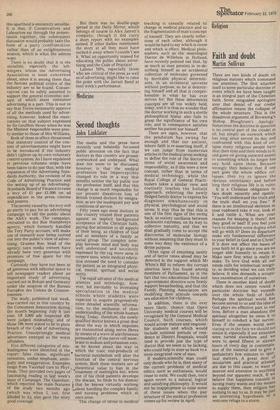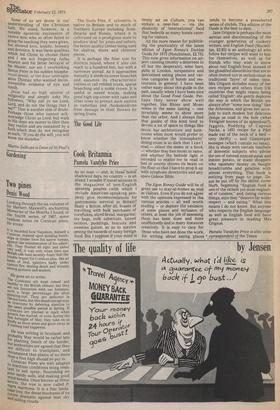Religion
Faith and doubt
Martin Sullivan
There are two kinds of doubt on religious matters which command our attention. The first attaches itself to some particular doctrine or event which we have been taught is an integral part of the Christian faith. Some misguided apologists aver that denial of our credal affirmation means the collapse of the whole structure. This is the disastrous argument of Browning's. 'Bishop Bloughram's Apology'. Sometimes the doctrine in question is no central part of the citadel at all, but simply an outwork which has long since served its day and confronted with this kind of collapse many religious people have shut their eyes and their minds to it, and gone on giving outward assent to something which no longer has any hold upon them. Because wrongly they believe that if one part goes the whole edifice collapses, they try to ignore the obvious uncertainty . and before long their religious life is in ruins. . It is a Christian obligation to face doubt squarely and openly. "You will understand the truth and the truth shall set you free." If there is an intellectual skeleton in your cupboard take it out, look at it and rattle it. What are your reasons for keeping it there? Are they good or bad? If you feel you have to abandon some dogma what will go with it? Does its departure make any fundamental difference to your belief in God and in Christ? If it does not affect the bases of your faith let it go since you are no longer able honestly to retain it. Make sure first what is really at stake. To love God with all our minds calls for intellectual integrity, in deciding what we can truly believe. It also demands a scrupulous examination of ourselves.
There is another kind of doubt which does not centre round a particular doctrine but extends over the whole field of faith. Perhaps the spiritual world has become unreal to us and the idea of God plays no effective part in our lives. Before a man abandons the spiritual altogether he owes it to himself to conduct a fair survey. Even if the unseen world were staring us in the face we should not notice it, especially if our attention were turned elsewhere and we were to spend fifteen or sixteen hours of every day in contemplation of the material and to Jive .a perfunctory few minutes to spiritual matters. A great deal of secularism and practical atheism are due to this cause; to want, of interest and attention to anything beyond our apparent reach. If We believe that happiness consists in having many wants and the means to supply them, then religion pas nothing to say to us. It may be just an interesting hypothesis or a welcome refuge in a storm.
Some of us are dense in our understanding of the Christian faith. We stand, however, in a notable apostolic succession of twelve men who so often failed to grasp the teaching they were given, but showed love, loyalty, honesty and devotion. It was these qualities Which led Christ to choose them and I am not forgetting Judas Iscariot and his bitter betrayal of his Master, nor am I overlooking Simon Peter in his sudden blasphemous denial, or the dour unimaginative Thomas who wanted incontrovertible evidence of eye and touch.
Jesus had no high opinion of religiosity and simply asks His followers, "Why call ye me Lord, Lord, and do not the things that I say?" That is another side of doubt. Perhaps those who cannot acknowledge Christ as Lord, but walk In His steps are nearer to Him than they realise and are sustained by a faith which they do not recognise as such. "If you do the will, you will know the doctrine."
Martin Sullivan is Dean of St Paul's



































 Previous page
Previous page